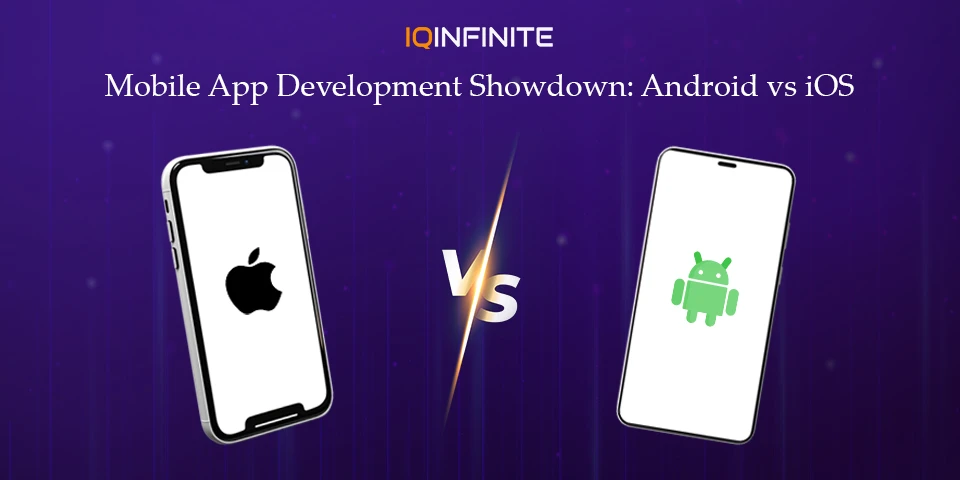Android vs iOS: Everything You Need to Know for App Development

In today’s mobile-first world, developing a successful app means choosing the right platform. Android and iOS dominate the global mobile landscape, each offering unique advantages, tools and user experiences. While Android is known for its flexibility and wide device reach, iOS stands out for its security, performance and premium user base.
Android Development
Overview
Android is a versatile, open-source operating system crafted by Google, powering a vast ecosystem of devices including smartphones, tablets, smart TVs and wearables. Renowned for its flexibility, customization capabilities and seamless integration across hardware, Android has become the world’s most widely used mobile platform, enabling developers to create innovative apps that reach billions of users globally.
Key Features of Android
1. Open-Source Platform: Developers have full access to the source code, allowing complete customization and flexibility in app development.
2. Extensive Device Compatibility: Android runs smoothly across a wide range of devices with varying screen sizes, processors and hardware configurations.
3. Customizable User Interface: Leveraging Material Design principles, Android enables the creation of interactive, visually appealing and highly adaptable UIs.
4. Support for Multiple Programming Languages: Android supports Java and Kotlin, with Kotlin emerging as the preferred language for modern app development.
5. Seamless Google Services Integration: Easily integrate with Google services such as Maps, Drive, Firebase and Ads to enhance app functionality.
6. Fast Deployment: Apps can be quickly published on Google Play Store and other third-party app stores, accelerating time-to-market.
7. Regular Updates: Android receives frequent updates to enhance features, security and overall performance.
2. Extensive Device Compatibility: Android runs smoothly across a wide range of devices with varying screen sizes, processors and hardware configurations.
3. Customizable User Interface: Leveraging Material Design principles, Android enables the creation of interactive, visually appealing and highly adaptable UIs.
4. Support for Multiple Programming Languages: Android supports Java and Kotlin, with Kotlin emerging as the preferred language for modern app development.
5. Seamless Google Services Integration: Easily integrate with Google services such as Maps, Drive, Firebase and Ads to enhance app functionality.
6. Fast Deployment: Apps can be quickly published on Google Play Store and other third-party app stores, accelerating time-to-market.
7. Regular Updates: Android receives frequent updates to enhance features, security and overall performance.
Benefits of Android Development
- Wide Market Reach: Android powers billions of devices worldwide, giving apps access to a massive and diverse user base.
- Flexibility and Customization: Developers can tailor apps extensively, from UI design to backend functionality.
- Cost-Effective Development: Open-source nature and support for multiple programming languages reduce development costs.
- Seamless Integration with Google Services: Enhance apps with features like Maps, Drive, Firebase and Ads effortlessly.
- Rapid Deployment and Updates: Apps can be published quickly on Google Play Store and updated frequently to meet user needs.
- Device Versatility: Apps can run on smartphones, tablets, smart TVs and wearables, expanding usage possibilities.
iOS Development
Overview
iOS is Apple’s proprietary, closed-source operating system, exclusively designed for devices such as iPhones, iPads and iPods. Renowned for its smooth performance, robust security and seamless ecosystem, iOS delivers a premium user experience. Its loyal and high-value user base, combined with strict quality standards, makes it the preferred platform for developers aiming to create high-quality, polished and innovative apps.
Key Features of iOS
1. Closed Ecosystem: A highly controlled environment ensures consistent app behaviour, quality and security.
2. Optimized Performance: Designed specifically for Apple hardware, delivering smooth, reliable and uniform performance.
3. User Interface Guidelines: Human Interface Guidelines (HIG) enable the creation of clean, intuitive and consistent UI/UX across apps.
4. Primary Programming Languages: Swift, a modern, safe and fast language, along with Objective-C for legacy apps.
5. Robust Development Tools: Xcode IDE provides a powerful simulator, interface builder and seamless integration with Apple frameworks.
6. High Security Standards: Strict app review processes and sandboxing mechanisms ensure top-level app security.
7. Strong Monetization Potential: iOS users are more likely to spend on premium apps, subscriptions and in-app purchases.
2. Optimized Performance: Designed specifically for Apple hardware, delivering smooth, reliable and uniform performance.
3. User Interface Guidelines: Human Interface Guidelines (HIG) enable the creation of clean, intuitive and consistent UI/UX across apps.
4. Primary Programming Languages: Swift, a modern, safe and fast language, along with Objective-C for legacy apps.
5. Robust Development Tools: Xcode IDE provides a powerful simulator, interface builder and seamless integration with Apple frameworks.
6. High Security Standards: Strict app review processes and sandboxing mechanisms ensure top-level app security.
7. Strong Monetization Potential: iOS users are more likely to spend on premium apps, subscriptions and in-app purchases.
Benefits of iOS Development
- Consistent Performance: Optimized for Apple hardware, iOS apps deliver smooth, reliable and uniform performance across all devices.
- Enhanced Security: Robust privacy protections, sandboxing and strict app review processes ensure top-level security for users and data.
- Premium User Base: iOS users are highly engaged and have strong purchasing power, offering excellent monetization opportunities.
- High-Quality Apps: Rigorous App Store guidelines maintain high standards, ensuring polished and reliable app experiences.
- Seamless Ecosystem Integration: iOS apps work effortlessly with Apple’s ecosystem, including macOS, watchOS and tvOS, enhancing user experience.
Conclusion
Android empowers developers with unmatched flexibility, broad device compatibility and rapid deployment, making it the ideal platform for reaching a vast and diverse global audience.
iOS shines in delivering secure, high-performance and polished apps to a premium user base, ensuring consistent quality and seamless integration within Apple’s ecosystem.
iOS shines in delivering secure, high-performance and polished apps to a premium user base, ensuring consistent quality and seamless integration within Apple’s ecosystem.
